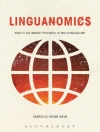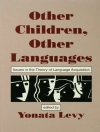This book highlights the need to develop new educational perspectives in which multilingualism is valorised and strategically used in settings and contexts of instruction and learning. Situated in the current educational debate about multilingualism and ethno-linguistic minorities, chapter authors examine the polarised response to heightened linguistic diversity and how the debate is very much premised on binary views of monolingualism and multi- or bilingualism. Contributors argue that the diverse linguistic backgrounds of immigrant and minority students should be considered an asset, instead of being regarded as a barrier to teaching and learning. From its title through to its conclusion, this book underlines the current perspective of multilingualism as possessing cutting edge potential for transforming diverse classrooms into more inhabitable, more equitable and more efficiently organised spaces for learning. This book will be of interest to scholars and researchers in educationallinguistics, applied linguistics, sociolinguistics, anthropological linguistics, pedagogics, educational studies, and educational anthropology.
Содержание
Introduction: The Multilingual Edge of Education.- Part I Multilingualism in Education in a Context of
Globalisation: A Status Quaestionis.- Strategies of Multilingualism in Education for Minority
Children.- Disrupting Linguistic Inequalities in US Urban Classrooms:The Role of Translanguaging .- Urban Multilingualism and Educational Achievement:.- Identifying and Implementing Evidence-Based Strategies for School Improvement.- Part II Linguistic Diversity in the Home Context and the Normative Discourses of Educational Institutions.- Teaching in Two Languages: The Pedagogical Value of Code-Switching in Multilingual Classroom Settings.- Multilingualism and Translanguaging as a Resource for Teaching and Learning in French Guiana .- Migration and Plurilingualism in Southern European Homes and Schools.- Translanguaging: A Matter of Sociolinguistics, Pedagogics
and Interaction? .- Part III Perception, Experiential Voice and Narrative in
Accounts of Multilingualism.- Double-Edged Valorizations of Urban Heteroglossia .- From the Margins to the Centre: Multilingual Teachers in a Monolingual System: Professional Identities, Skills
and Knowledge .- Children’s Bilingualism: An Inspiration for Multilingual
Educational Practices.- Teaching African Languages theUbuntu Way: The Effects
of Translanguaging Among Pre-Service Teachers in South
Africa.- Part IV The Added Value of Plurilingual Repertoires
Breaking Out of L2-Exclusive Pedagogies: Teachers
Valorizing Immigrant Pupils’ Multilingual Repertoire in
Urban Dutch-Medium Classrooms.- Translanguaging as a Key to Educational Success: The
Experience of One Irish Primary School.- Conclusion: Multilingualism, Diversity and Equitable
Learning: Towards Crossing the ‘Abyss’.- Index
Об авторе
Piet Van Avermaet is Professor in ‘Language and Diversity’ in the Linguistics Department of Ghent University, Belgium. He is also Director of the Centre for Diversity & Learning at the same University.
Stef Slembrouck is Senior Full Professor in English Linguistics at Ghent University, Belgium. He is also Director of the University Language Centre.
Koen Van Gorp is Head of Foreign Language Assessment at the Center for Language Teaching Advancement and affiliated faculty of the Second Language Studies Program at Michigan State University, USA.
Sven Sierens is Senior Researcher at the Centre for Diversity & Learning, Linguistics Department at Ghent University, Belgium.
Katrijn Maryns is Postdoctoral Researcher (FWO- Research Foundation Flanders) in the Linguistics Department at Ghent University, Belgium.
r>












